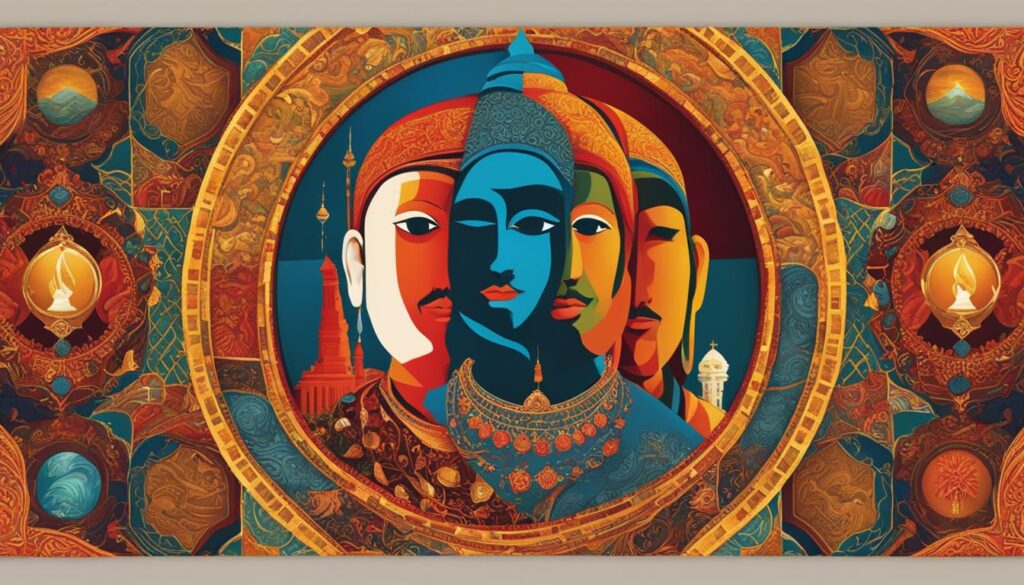We may earn money or products from the companies mentioned in this post.
Religious customs are an integral part of many cultures around the world. They are a reflection of the diverse beliefs, traditions, and rituals that shape our spiritual identities. From the colorful celebrations of Diwali in India to the solemn observances of Lent in the Christian faith, religious practices are a powerful expression of devotion and faith.
Through the exploration of religious customs, we can gain insight into the beliefs and values that underpin different faiths. By understanding these practices, we can also foster a greater appreciation and respect for cultural diversity.
In this guide, we will delve into the rich tapestry of global religious customs. We will explore the different traditions, rituals, and beliefs that shape these practices, and examine their cultural significance. Join us on this journey of discovery as we explore the fascinating world of religious customs.
Key Takeaways:
- Religious customs are an important part of cultural identity and spiritual expression.
- Understanding religious practices can promote appreciation and respect for diversity.
- Religious practices are shaped by a variety of traditions, rituals, and beliefs.
- The diversity of religious customs reflects the richness of global cultures.
- Exploring religious customs can deepen our understanding of beliefs and values.
Exploring Religious Traditions
Religious traditions are a crucial part of cultural practices worldwide. They are passed down from one generation to the next, shaping cultural identities, and providing a deeper understanding of history and beliefs.
Some of the most interesting religious traditions involve music, dance, and storytelling. These practices comprise a form of cultural expression that connects people with their past and the divine, creating a unique blend of spiritual and artistic experiences that are both captivating and informative.
The Role of Music and Dance in Religious Traditions
Music and dance play vital roles in religious traditions worldwide. They serve as a way to express devotion and provide a form of entertainment that connects people with their cultural heritage.
Many religious traditions incorporate music and dance to tell stories and convey important messages that inspire faith and bring people together. For example, in Hindu traditions, classical Indian dance is used to tell stories of gods and goddesses, while Sufi whirling is featured in Muslim traditions as a form of spiritual meditation.
The Significance of Storytelling in Religious Traditions
Storytelling is another essential element of many religious traditions. It provides a way to share important moral and ethical teachings, historical accounts, and cultural practices.
In Native American religions, storytelling is a means of passing down oral traditions that date back thousands of years. These stories often involve characters that represent various natural elements, such as animals, trees, and the sun and moon.
The Importance of Customs and Traditions
Customs and traditions are a vital part of religious practices. They provide a framework for religious ceremonies and celebrations, creating a sense of community and belonging among followers.
| Religious Tradition | Customs and Traditions |
|---|---|
| Hinduism | Worshiping multiple deities, cremation of the dead, cow veneration |
| Judaism | Sabbath observance, circumcision, Passover Seder |
| Islam | Five daily prayers, fasting during Ramadan, hajj pilgrimage |
Table: Examples of Religious Traditions and their respective Customs and Traditions
From Hinduism to Judaism to Islam, different religions have their unique customs and traditions that are followed religiously. By understanding these practices, individuals can better appreciate the diversity of beliefs and practices that exist worldwide.
Conclusion
Religious traditions, cultural practices, customs, and traditions are essential components of various beliefs and serve as a source of connection between people and their faith. Understanding the importance of these practices can help us appreciate the beauty and diversity of different beliefs worldwide.
Rituals and Ceremonies
Religious rituals and ceremonies are an essential part of many faiths, providing a way to express devotion, spirituality, and reverence. These customs have been an integral part of human civilization, dating back to the earliest recorded history.
From lighting candles and burning incense to chanting prayers and performing complex rituals, each religious tradition has its own unique set of customs. Rituals and ceremonies help to connect us with the divine and provide a sense of community and shared purpose.
One of the most well-known religious rituals is the Christian mass. The mass involves a series of prayers, hymns, and readings from the Bible, culminating in the Eucharist, where the bread and wine are consecrated and shared amongst the congregation.
The role of rituals and ceremonies
Rituals and ceremonies serve different purposes in different faiths. Some are designed to help us connect with the divine, while others are intended to mark important life events such as birth, marriage, and death.
In Hinduism, the Diwali festival is a joyous celebration of light triumphing over darkness. The festival involves lighting lamps, exchanging gifts, and performing a variety of cultural rituals, including the worship of deities such as Lakshmi, the goddess of wealth.
The symbolism of religious customs
Religious rituals and customs are rich in symbolism, providing deep insights into the beliefs and values of different faiths. For example, in Judaism, the Passover Seder involves a variety of symbolic foods and rituals that mark the Israelites’ escape from slavery in ancient Egypt.
| Symbol | Meaning |
|---|---|
| Bitter herbs | Remind us of the bitterness of slavery |
| Matzah (unleavened bread) | Symbolizes the Israelites’ hastily prepared bread as they fled Egypt |
| Candlelighting | Represents the light of freedom and the hope for redemption |
Understanding the symbolism behind religious customs can deepen our appreciation and respect for different faiths and traditions.
The importance of customs and traditions
Religious customs and traditions help to preserve cultural heritage and identity, providing a link to our ancestors and the history of our faith. They also serve to bring together communities and promote social cohesion.
For example, the Islamic holiday of Eid al-Fitr marks the end of the month-long fast of Ramadan and involves a variety of festive customs, including feasting, giving gifts, and communal prayer. The holiday serves to bring together families and communities in a joyous celebration of faith and culture.
Overall, religious rituals and customs are an essential part of human experience, providing a way to connect with the divine and express our deepest beliefs and values.
Beliefs and Faiths
Religious beliefs form the foundation of the customs, practices, and traditions that shape different faiths around the world. These beliefs are often grounded in ancient texts, spiritual teachings, and cultural practices, and provide individuals with a sense of purpose, identity, and community.
At the core of many religious beliefs is the idea of a higher power or divine being that governs the universe and provides guidance and meaning to human life. For example, in Christianity, the belief in one God who created the world and sent his son Jesus to save humanity is central to the faith.
In Hinduism, a complex and diverse belief system that has roots dating back over 4,000 years, the concept of karma, or the idea that actions have consequences that affect one’s future, is a fundamental tenet. Other key beliefs, such as the cycle of birth, death, and rebirth, the importance of meditation and self-realization, and the worship of multiple gods and goddesses, also shape Hindu religious practices and traditions.
Islam, one of the fastest-growing religions in the world, centers around the belief in one God, Allah, and the teachings of the Prophet Muhammad, who received the Quran as a revelation from God. Islamic beliefs include the importance of prayer, charity, and fasting during Ramadan, as well as the belief in angels, judgment day, and the afterlife.
Buddhism, a non-theistic religion based on the teachings of the Buddha, emphasizes the importance of individual spiritual development and the attainment of enlightenment. Key beliefs include the Four Noble Truths, the Eightfold Path, and the concept of impermanence, which holds that all things are in a constant state of change.
These are just a few examples of the diverse and complex religious beliefs that shape customs, practices, and traditions around the world. Understanding and respecting these beliefs is essential to creating a more inclusive and harmonious society, where individuals of different faiths can coexist and thrive.
Celebrations and Festivals
Religious celebrations and festivals are an integral part of many cultures worldwide, reflecting deeply rooted customs and traditions. They serve as occasions for communities to gather together, celebrate, and honor their shared beliefs and cultural heritage.
Throughout the year, numerous religious celebrations and festivals take place worldwide, each with its unique customs and traditions. These events provide valuable insight into the diverse range of beliefs and religious practices observed globally.
Examples of Religious Celebrations and Festivals
| Religion | Celebration/Festival | Date | Customs and Traditions |
|---|---|---|---|
| Christianity | Christmas | December 25th | Decorating Christmas trees, exchanging gifts, attending church services |
| Islam | Eid al-Fitr | The end of Ramadan | Praying, giving zakat to the poor, preparing special foods, exchanging gifts |
| Judaism | Hanukkah | December | Lighting the menorah, eating foods fried in oil, playing games with dreidels |
| Hinduism | Diwali | October/November | Lighting diyas (lamps), preparing special foods, exchanging gifts, fireworks |
These are just a few examples of religious celebrations and festivals that take place worldwide. Each event provides a unique opportunity for communities to come together and celebrate their shared heritage and traditions.
Regardless of the specific customs and traditions, these celebrations and festivals serve as a reminder of the importance of preserving cultural heritage and traditions.
Conclusion
After exploring the diverse range of religious customs, traditions, rituals, and beliefs across the world, it is clear that understanding and respecting these practices is crucial for building a more inclusive and harmonious society.
By recognizing the significance of cultural practices and customs, we can expand our knowledge and break down barriers of ignorance and intolerance. This requires an open mind and willingness to learn about different beliefs and customs without judgment or prejudice.
Respect and Tolerance
Respect and tolerance are essential values that promote peaceful coexistence among people of diverse backgrounds. By acknowledging and respecting the differences in religious practices, we can foster a more empathetic and compassionate world.
We can celebrate and appreciate the diversity of religious practices and customs without imposing our beliefs on others or disrespecting their faiths. Upholding these values will lead to a more enriched and fulfilling life, as well as a better world for all of us.
Let us all strive to learn more about the religious practices and customs of other cultures and communities. This will promote greater respect, tolerance, and understanding in our increasingly diverse and interconnected world.
FAQ
What are religious customs?
Religious customs refer to the practices, traditions, rituals, and beliefs that are followed by individuals and communities as part of their religious faith.
Why are religious customs significant?
Religious customs hold great significance as they serve as a way for individuals to express their devotion, spirituality, and cultural identity. They often play a central role in religious ceremonies and celebrations.
How do religious customs vary across different cultures and faiths?
Religious customs vary greatly across different cultures and faiths. Each community has its own unique set of customs and practices that are influenced by factors such as geographical location, historical events, cultural traditions, and religious beliefs.
How are religious customs passed down through generations?
Religious customs are typically passed down through generations through oral traditions, teachings, and religious education. Families and religious institutions play a crucial role in transmitting these customs to younger members of the community.
What is the role of rituals and ceremonies in religious customs?
Rituals and ceremonies are an integral part of religious customs. They serve as symbolic acts that express devotion, mark important life events, and create a sense of community among believers.
Can religious customs change over time?
Yes, religious customs can evolve and change over time. They may be influenced by social, cultural, and historical changes, as well as by individual interpretations and adaptations within a particular faith tradition.
How can understanding religious customs promote a more inclusive society?
Understanding and respecting different religious customs is essential for fostering a more inclusive society. It promotes tolerance, empathy, and appreciation for diversity, allowing individuals from different backgrounds to coexist harmoniously.
Are religious customs the same as religious beliefs?
While religious customs and beliefs are closely related, they are distinct. Religious customs refer to the specific practices and rituals followed, whereas religious beliefs encompass the core tenets, doctrines, and philosophical foundations of a particular faith.
Are there any common themes or values across different religious customs?
Yes, there are often common themes and values that can be found across different religious customs, such as love, compassion, gratitude, and the pursuit of inner peace. These universal values serve as guiding principles for believers in various faiths.
Affiliate Disclosure: This post may contain affiliate links. If you purchase through our link, we may receive a small commission, but at no additional cost to you. For more information, please see our Disclosure statement.



